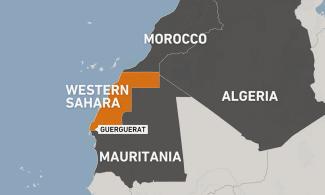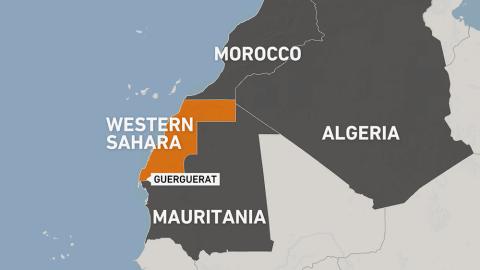
Fashina noted that the Western Sahara territory had been given the right to self-determination as far back as 1963 as spelt out in the United Nations General Assembly resolution 1514.
Nigerian Movement for the Liberation of Western Sahara has condemned a communique issued by the Imani Center for Policy and Education over the self-determination of Western Sahara.
In a statement sent to SaharaReporters, Dipo Fashina, coordinator of the NMLWS stated that the resolution of the Imani Center on the issue which justified Morocco's claims of sovereignty over the Territory of Western Sahara was not only subjective but a historical fraud.

Imani Center had stated after its June 27, 2021 seminar in Ghana that the "participants considered the admission into the Organisation of African Unity (OAU), then its maintenance by the AU, of a non-state entity, which has, since merely been a source of obstructions and division, as a striking example to this day. According to the participants, the AU should correct this 'cumbersome legacy' and 'historical miscarriage'.
"Thus, the suspension, if not the expulsion, of the 'SADR' (The Sahrawi Arab Democratic Republic, also known as Western Sahara), an armed group with no attributes of a sovereign State, must not be considered as a taboo or unattainable objective."
Fashina noted that the Western Sahara territory had been given the right to self-determination as far back as 1963 as spelt out in the United Nations General Assembly resolution 1514.
He also stated that the International Court of Justice already issued an advisory opinion that denied Morocco's claims of autonomy and affirmed the right of the Saharawi people to self-determination.
Fashina also condemned the stance of the Imani Center as he noted that the resolution of the conflict between the Saharawi people and the kingdom of Morocco over Western Sahara would contribute to the regional and continental economic integration of Africa.
The statement reads: ”The attention of the Nigerian Movement for the Liberation of Western Sahara has been drawn to a communique issued by Imani Center for Policy and Education, a 'think tank' as the outcome of a Seminar held in Accra, Ghana, titled ‘The imperative of Economic Recovery: How can the Resolution of the Sahara Issue Strengthen Africa's Regional and Continental Integration?" Published in The Guardian online edition (Nigeria), 29 July 2021.
“Coming from Ghana, a country that played a remarkable role in the liberation struggles in Africa and gave Africa one of the best models of leadership, in the history of anti-colonial, liberation struggles in the world, the communique calls into question, the real motive of its authors.
“The seminar aims ‘aims to debate and discuss the African Union's current challenges in an Objective, Scientific and dispassionate manner, in the context of a highly intellectual and fact-based exercise with credible experts and influential decision makers’.
“A very serious problem is that the Communique falls very much short of the criteria of objectivity, scientific merit and dispassionateness which the authors claim on their own behalf.
“The communique is intellectually unsound, politically weak, historically out of place, unjust in political morality, it demonstrates huge ignorance of the history and contemporary issues around which the issue of Western Sahara is being discussed worldwide.
“The communique smacks of treachery to the history and substance of the liberation struggles in Africa led by Kwame Nkrumah, Samira Machel, Eduardo Chivambo Mondlane, Augustinho Neto, Julius Nyerere, Nelson Mandela, Ahmed Ben Bella, Amilcar Cabral and many other great African leaders."
It continued, “...The General Assembly had demanded that Spain should undertake immediate steps to guarantee the exercise of self-determination under UN General Assembly Resolution 1514 (XV) adopted in 1960. The General Assembly had always maintained that the people of Western Sahara are entitled to the right of self-determination.
“As far back as 1963, the Territory if Western Sahara was listed among Non-self-governing territories as recognized in the UN General Assembly Resolution 1514 of 14 December 1960 that contained the Declaration on the Granting of Independence to Colonial Countries and Peoples. It should be recalled that under Resolution 1514 (XV), the General Assembly, declared inter alia that all peoples have the right to self-determination and that by virtue of right, they should freely with determine their political status and freely pursue their economic, social and cultural development.
“In this regard, the right of the people of Western Sahara to a referendum for self-determination has been reaffirmed by both the General Assembly and the UN Security Council as well as by the International Court of Justice.
“Morocco has never acquired the status of an administering Power of the Territory of Western Sahara in terms of Article 73 of the UN charter. The UN list of non-self-governing territories confirms that after the withdrawal and abandonment of responsibilities by Spain on 26 February 1976, Western Sahara has not had any other administering Power.
“With regards to Morocco's claims of sovereignty over the Territory of Western Sahara. It should be recalled that on 16 October 1975, the International Court of Justice issued an Advisory Opinion that denied the claims of Morocco and Mauritania and affirming the right of the Saharawi people to self-determination under international law.
“...In view of these, the Western Sahara is a question of decolonization and therefore cannot be settled and should not be settled without the granting of the inalienable right to self-determination (decolonization) for the Saharawi people.
“From all we have seen, the so-called Moroccan plan of autonomy is neither credible nor serious...
“The position of the African Union is well spelt out as the Saharawi Arab Democratic Republic (SADR) became a member state of the Organization of African Unity in 1982. It should be recalled that membership to the OAU was open to any independent sovereign African State. The admission of SADD to the membership of the OAU in 1982 signified that more than half of the Member States of the OAU recognised Western Sahara as an independent sovereign African state.
“It goes without saying that the resolution of the conflict between the Saharawi people and the kingdom of Morocco over Western Sahara would contribute to the regional and continental economic integration of Africa.
“However, the just resolution of the question of Western Sahara is the implementation of the settlement plan enunciated in 1991 by the United Nations and the Organization of African Unity and agreed upon by both Morocco and the Polisaro Front in 1991.
“Any solution not based on the history of Western Sahara and political principle of the right of all nations to self-determination will not resolve the question of Western Sahara. Historical justice will be done when the Saharawi come to rule themselves in a Saharawi state. This is where we stand.
“The Nigerian Movement for the Liberation of Western Sahara (NMLWS), wishes to use this opportunity to reiterate its u alloyed support to the people and government of the Saharawi Arab Democratic Republic.”
Document: How Not to Defend Colonialism in Africa by Sahara Reporters on Scribd